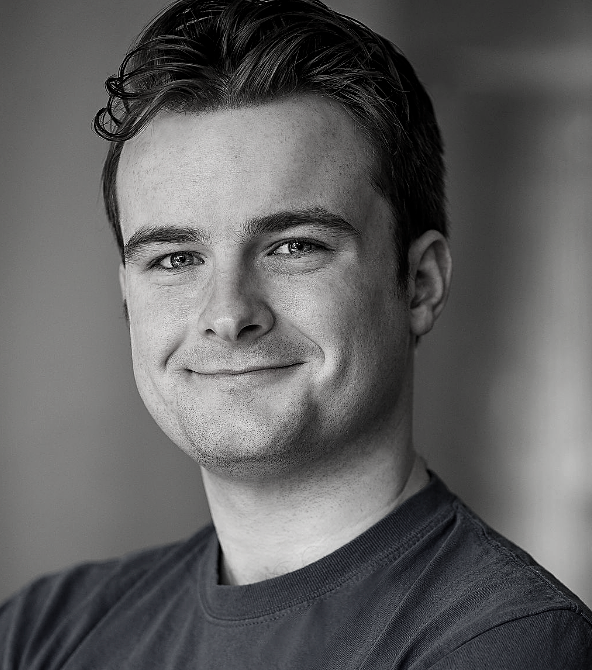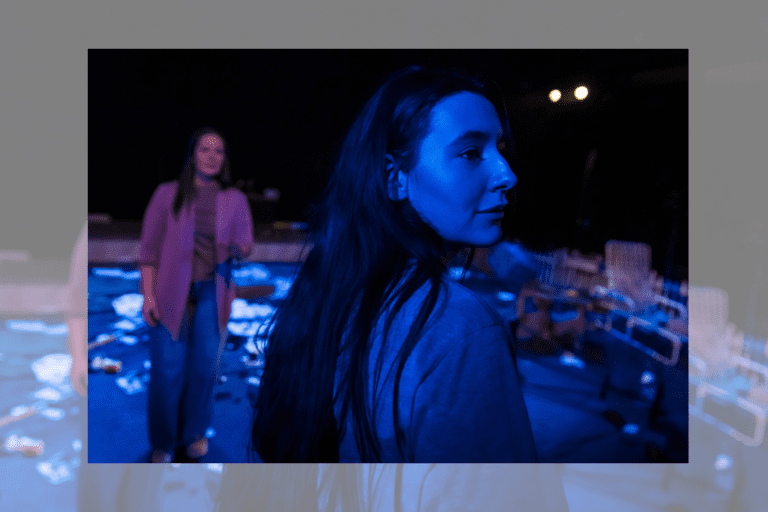REVIEWS: Toronto International Film Festival 2024
A filmed production of an experimental Egyptian opera, a TV series penned by Canadian playwright Jordan Tannahill, and the moviemaking debut of Broadway director Marianne Elliott are among the offerings at this year’s Toronto International Film Festival (TIFF) with connections to the world of theatre.
As a warm up for this year’s busy-as-ever fall stage season, I’ll be covering a handful of such films for Intermission. We’ll publish these capsule reviews below over the course of the festival (running September 5 to 15), with new additions slotted in at the top for ease of navigation. See you on King Street!
The Listeners (Primetime)
Fiction tends to shed a few psychological layers in the trek from page to screen, so what impresses me about the first two episodes of screenwriter Jordan Tannahill’s disquieting miniseries adaptation of his novel The Listeners is how deeply they manage to burrow into their protagonist’s mind.
Claire (Rebecca Hall), a British high school teacher, one day starts hearing a persistent, bassy hum. After a couple weeks of doctors insisting the cause is menopause or stress, her student Kyle confides that he, too, hears the sound. Despite the school board’s strict rules against teachers interacting with pupils outside of instructional hours, they together begin to investigate their shared affliction, eventually ending up at a support group for fellow Hum-hearers.
The Listeners’ pacing is on the lackadaisical side, which may irk those already disposed against the idea of stretching a 300-page novel into a five-part miniseries. But this gradual approach allows for a particularly deliberate sowing of dread. (Plus, as Tannahill revealed in a 2021 interview with Intermission, his first draft of The Listeners was a four-ish-hour play — so it’s long been natural for this story to stretch beyond the confines of a feature film.) And Hall does excellent work within the series’ mysterious, bubbling atmosphere; she captures in detail the terror of having your body inexplicably malfunction. Tannahill and director Janicza Bravo have got me curious about the rest of the series — I’m invested, if not quite hooked.
Really Happy Someday (Discovery)
There’s something special, if a little unreal, about seeing familiar environments depicted on screen. That’s why J Stevens’ accomplished debut feature Really Happy Someday is likely to be an intense experience for many Toronto theatre lovers. Beyond unfolding partly at the inimitable Queen West bar Squirly’s and returning repeatedly to the song “Favorite Places” from the musical Ordinary Days (which played in Toronto just over a year ago), it stars actor/playwright Breton Lalama, a new fixture of the city’s theatre scene.
Lalama plays Z, a transmasculine musical theatre performer who recently started taking testosterone. After bombing an audition for Éponine in Les Misérables on Broadway, Z decides to shake up his life by dropping his agent and getting a job as a bartender. This downward spiral continues until he begins training with a sensitive singing instructor named Shelly (Ali Garrison), who helps guide him through the rocky waters of his evolving voice.
In a post-screening Q-and-A, co-writers Lalama and Stevens explained that the film was shot over the course of a year, letting Lalama’s voice change along with Z’s. Similarly, Garrison is a real vocal teacher, with the lessons in the film taking place in her studio. Really Happy Someday bursts with such freewheeling spontaneity that none of this information shocks — “of course it’s a little real!,” I found myself thinking.
And while the performances are generous and textured down the cast list, it’s particularly touching to see Lalama working in this intimate register after his highly theatrical comedic turn in Canadian Stage’s The Inheritance. I could see myself returning to this film decades from now; it’s that good a time capsule of this crazy, shifting moment.
Village Keeper (Discovery)
Canadian stage artists d’bi.young anitafrika and Oyin Oladejo appear briefly in writer-director Karen Chapman’s debut feature drama, a swift, Toronto-set study of a generous single mother struggling to make ends meet. Ever since her husband’s death, Jean (Olunike Adeliyi) and her pair of teenage children, the attentive Tamika (Zahra Bentham) and the restless Tristin (an amusing Micah Mensah-Jatoe), have lived in the crowded apartment of Jean’s sweet mother (Maxine Simpson). But when bloodstains begin to appear in and around the cacophonous Lawrence Heights apartment complex, the overwhelmed Jean decides to seek out a therapist (anitafrika).
After a steadily paced exposition, the 83-minute Village Keeper sprints to tie up its many narrative threads, diminishing their potential gravity; it’s telling that the unserious phrase “treat yourself!” so neatly summarizes one of the film’s primary arcs. More mature than the screenplay is Jordan Oram’s compassionate hand-held cinematography, which gets a lot right about Toronto — from the torpor of commuting on Line 2 to the gauzy glow of Chinatown at night and the sunny August hum of Caribana.
They Will Be Dust (Platform)
If 85 per cent of this kinetic feature from Spanish director Carlos Marques-Marcet weren’t an ensemble drama about assisted suicide, I might call it one of the most interesting new musical movies in years. Instead, it’s something more ambitious: a true hybrid.
When an aging theatre director named Flavio (Alfredo Castro) and his dying wife Claudia (Ángela Molina) decide to end their lives in Switzerland, emotions ignite — to such blazing heights that sometimes speech becomes inadequate and rapturous musical sequences begin. Often-wordless choral singing punctuates these dance-heavy looks into Claudia’s scuttling mind. While the movement vocabulary is unmistakably modern, Marques-Marcet mixes in a tablespoon of Busby Berkeley, with the more elaborate numbers unfolding on sound stages; at the climax of one about cremation, dancers atop a mound of ashes flock Claudia’s severed head.
They Will Be Dust’s marriage of genres isn’t without tension. There’s always something a little off about these opposite styles sharing a bed. But when the pairing clicks, both parties thrive. And while many musicals make magic out of the leap from script to song, They Will Be Dust — with its meaty stretches of silence-filled melodrama, and plot magnetized by death — explores more existential territory: what it means for the music to stop.
The Salt Path (Special Presentations)
Adapted from Raynor Winn’s 2018 memoir of the same name, this drab debut film from Curious Incident of the Dog in the Night-Time director Marianne Elliott concerns Ray (Gillian Anderson) and Moth (Jason Isaacs), a middle-aged British couple who recently lost their home to debt collectors. With a monthly tax credit their only source of cash, they make the spontaneous decision to backpack the Salt Path, a 630-mile section of the southwest English coast. The journey proves particularly arduous for Moth, who’s in the midst of battling corticobasal degeneration (CBD), a rare and life-threatening neurodegenerative disease.
As a portrait of a sturdy marriage, the narrative is compelling enough. But beyond the occasional striking establishing shot (cinematography by Hélène Louvart), there aren’t many productive cinematic ideas here: the flashback-ridden structure of Rebecca Lenkiewicz’s screenplay lacks imagination, and Elliott’s tendency to zoom in on soaring birds as strings grandly swell is overkill the first time, never mind the third. While Anderson and Isaacs are working admirably hard — that is, indeed, a lot of walking — The Salt Path could likely have remained on the shelves of Indigo.
Drama 1882 (Wavelengths)
Chances to engage with international performance arrive in Toronto with depressing rarity, making this provocative filmed opera from Egypt a valuable offering.
Directed, composed, and choreographed by reputed visual artist Wael Shawky for its premiere at the 2024 Venice Biennale, Drama 1882 drops the viewer into the nitty-gritty of 19th-century Egyptian politics with its classical Arabic libretto’s first line (translation by Injy Ashour): “We were full of hope, as Tewfik’s history showed no indication that he complies with foreign influence or supporting the Circassians.”
An onscreen text bubble explains that during the opera’s titular year, “Tewfik” was the name of the Khedive of Egypt, against whom this group of characters is revolting as part of the Urabi uprising (which spanned from 1879 to 1882 and failed, with Egypt remaining under colonial occupation until 1956). If this seems over-dense, so at times is the opera — at the Biennale, Shawky contextualized the piece with a supplementary art installation, something that may have helped prepare audiences for the onslaught of information.
The feathery tone of Shawky’s 45-minute production runs perpendicular to its tangly subject matter. Gentle, sustained movements recalling Robert Wilson anchor the mammoth ensemble’s physical vocabulary: even during heated verbal exchanges, choreographer Mirette Mechail often has the performers sway serenely back and forth with little emotion. Title cards split the film into eight chapters, each on a new pastel-lathered set — transitions that’d be unfeasible live. Whether it’s a live donkey named Sobhy or a dolled-up Queen Victoria marching daintily through a field of bricks, Drama 1882 is always churning out new things to look at, making it disarmingly easy to get lost in the spectacle.
Note: I viewed a digital screener of Drama 1882.
By the Stream (Centrepiece)
For two reasons, I’ve often felt that Korean filmmaker Hong Sang-soo emanates a kind of “let’s put on a play!” energy: first, he outputs his ragtag work at a pace more typical of directors of theatre than film (eight features over the last four years); and, second, he tends to capture conversations in drawn-out group shots, a framing not dissimilar to that of a stage.
So it’s fitting that his tender new film By the Stream concerns a university skit festival. After the original director of her department’s 10-minute play gets fired for misconduct, Jeonim (Kim Minhee), a lecturer at the school’s college of art and design, asks her retired theatre artist uncle Sieon (Kwon Haehyo) to help her four students stage something new in a week and a half.
Despite the low artistic stakes of the setting, he fully commits himself to both the process of creation and the odd social bubble surrounding it, which includes Jeonim’s wealthy supervisor, a professor named Jeong (Cho Yunhee). As is Hong’s way, these fresh relationships bud in dimly lit restaurants, where hearty doses of eel, wine, and makgeolli give way to teary monologues and crossed boundaries.
Sieon’s skit is dreadful. Though bookended with surreal sound and lighting design, it mostly consists of the students munching on Spam around a table. There’s little action to speak of, and one of the performers is completely closed off from the audience — an issue she’d brought up in rehearsal.
But more significant to the essence of By the Stream is the formal reversal at play: just as the skit’s representation of communal eating resembles a Hong film, the outside world feels in some ways like a theatre, with the camera at one point tilting upward to catch a brief, blurry glimpse of a full moon, blinding the viewer like an actor under stage lights. I’ve not seen quite enough Hong to pinpoint where By the Stream ranks in his voluminous oeuvre — but these small bumps in the film’s low-key surface give it a borderline mystical quality that I just adore.
Note: I viewed a digital screener of By the Stream.
TIFF runs downtown until September 15. More information is available here.
Intermission reviews are independent and unrelated to Intermission’s partnered content. Learn more about Intermission’s partnership model here.














Comments